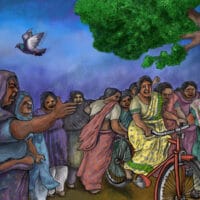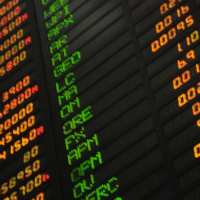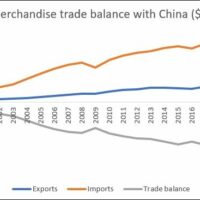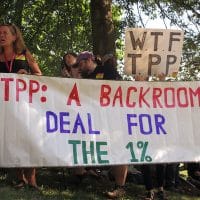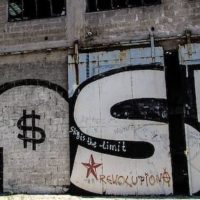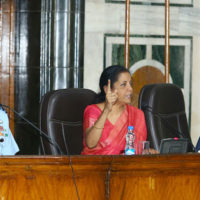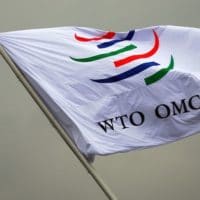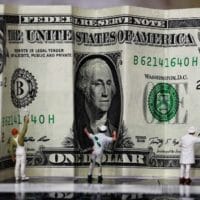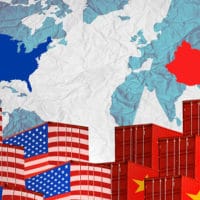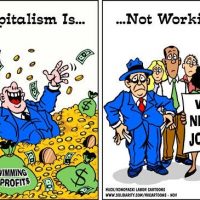-
The United States and the Bretton Woods Twins
With President Donald Trump and his team launching an aggressive attack on international institutions and threatening to pull out from many of them, there has been speculation about whether they would adopt the same strategy with respect to the Bretton Woods institutions.
-
Trump 2.0: An inflection point for global capitalism?
“This is a new form that inter-imperialist relations have taken. It is not the old form of inter-imperialist rivalry that precipitated world wars.”
-
Women’s work is not valued properly
In an interview with The Hindu, Ghosh talks about gender blindness of official policies, inequalities in society, the state of women empowerment and why women face multiple disadvantages in India.
-
Capital flight from emerging markets
Financial markets in the so-called ‘emerging economies’ are in turmoil. At the end of May 2022, the Financial Times reported that the return delivered by emerging market (EM) sovereign bonds was around minus 15 per cent for 2022, the worst since 1994.
-
Why are global wheat prices rising so much?
The global food crisis has now grown to such proportions that everyone is talking about it (even though world leaders are doing relatively little about it).
-
What has the Trade “War” between the United States and China achieved?
On July 6, 2018, U.S. President Donald Trump unilaterally imposed a 25 per cent tariff on Chinese imports of around $34 billion, and further tariffs in 2018 and 2019—claiming that trade between U.S. and China had been unfairly skewed in China’s favour and needed to be rebalanced.
-
TNCs reviving TPP Frankenstein
The incoming Biden administration is under tremendous pressure to demonstrate better U.S. economic management. Trade negotiations normally take years to conclude, if at all. Unsurprisingly, lobbyists are already urging the next U.S. administration to quickly embrace and deliver a new version of the Trans-Pacific Partnership (TPP).
-
Engels on the Peasant War in Germany
At a time when peasant masses in the country are engaged in a valiant struggle for the repeal of the Central government’s three infamous laws, and have laid peaceful siege to Delhi, braving rains and bitter cold, it is worth recalling Friedrich Engels’ study of the peasant war in Germany in 1525, that also celebrated its outstanding leader Thomas Muenzer. Such a recall becomes necessary for another reason.
-
The problem of external debt
There is a massive problem of external debt building up for the third world, of which the recent Argentine debt crisis was only one manifestation. At the root of the problem is the collapse of primary commodity prices in the world market which began in April 2011.
-
Finance’s preference for the Metropolis
The current globalization was always legitimized by the argument that capital today, unlike in colonial times, had become blind to racial and other such distinctions across countries in deciding upon its location; it would now flow wherever opportunities for profitable investment existed.
-
Globalisation and the pandemic
SSER-IDEAS Online Lecture Series — COVID-19 Pandemic: Policy Failures and Their Impact on the Lives of People
-
A niggardly response to an extraordinary crisis
In a show of solidarity, some of India’s opposition leaders have declared the much-delayed relief package (titled Pradhan Mantri Garib Kalyan Yojana) announced by Finance Minister Nirmala Sitharaman on March 26 to mitigate the effects of the Coronavirus pandemic on the poor as a welcome “first step”.
-
No escape from low growth
Discussions on the state of the world economy centre around the likely negative impact of the novel coronavirus epidemic and the potential positive effect of the truce reflected in the “phase 1” trade deal between China and India.
-
The perversity of the neo-liberal fiscal regime
When income growth slows down in an economy, so does the growth of tax revenue within the given tax regime. Since the government has certain expenditure obligations, to meet these obligations it has to either impose additional taxes or expand its fiscal deficit.
-
End of the free trade myth
“Is that a big deal?”, some may ask. It is to those who have pushed for achieving the far-reaching liberalisation of trade in an unequal global order, first under the General Agreement on Tariffs and Trade (GATT), and then under the auspices of the agreements that established the WTO and defined and expanded its remit.
-
The debate over inequality
The debate over inequality has become hotter world-wide. While Trump had introduced substantial tax cuts for the rich in 2017, and Britain’s Boris Johnson, the front-runner to succeed Teresa May, has promised to do the same if he becomes Prime Minister, there are strong proposals for taxing the rich which have also been mooted. Bernie Sanders had such a proposal for the U.S. during the time that he was seeking the Presidential nomination of the Democratic Party.
-
Disruption in the world of trade
What is noteworthy is that the deceleration in import volume growth has been particularly marked in the emerging economies of Asia and Latin America, pointing to a loss of momentum in the countries that were expected to be new growth poles in the immediate aftermath of the 2007 crisis.
-
Finance and growth under neo-liberalism
A neo-liberal capitalist economy therefore does not have the instruments that capitalism earlier had for providing a bulwark against its slipping into recession and stagnation; the question is: does it have any instruments at all?
-
The Yellow Vest movement
Nothing shows the crisis of neo-liberal capitalism more clearly than the popular uprising in France that is occurring under the banner of the “Yellow Vest” movement.
-
Contemporary capitalism and the world of work
The most significant feature of contemporary capitalism which is of relevance to the world of work is its inability to provide work to a substantial proportion of persons looking for it.



